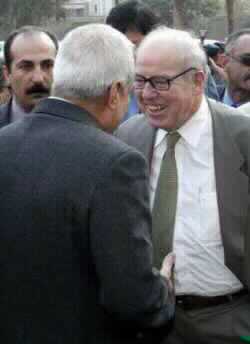Chief U.N. arms inspector Hans Blix flew to Baghdad Sunday to demand that Iraq stop dragging its feet and volunteer evidence on its weapons programs to avert the threat of war. Blix flew in from Cyprus with Mohamed ElBaradei, head of the United Nations nuclear agency, in what Blix said was a last-ditch bid to get Iraq's full cooperation before they report back to the U.N. Security Council on January 27.
The ensuing debate may be crucial to deciding whether the United States launches the war on Iraq that it has threatened while demanding Baghdad come clean on its alleged nuclear, chemical and biological weapons programs.
Within a few hours of arriving, the two inspectors began talks at the Foreign Ministry with President Saddam Hussein's scientific adviser Amir al-Saadi, and General Hussam Mohammad Amin, head of Iraq's National Monitoring Directorate.
Demands that the inspection process should be given a chance to resolve the conflict picked up steam Saturday when a wave of anti-war protests rolled around the world from Tokyo to London and the United States -- where tens of thousands, perhaps more, attended celebrity-led rallies.
Blix insisted it was in Iraq's power to avert war.
"We don't think war is inevitable. We think the inspection process we are conducting is the peaceful alternative, and it requires very active Iraqi cooperation," he said after arriving in Baghdad.
"WE NEED PROOF"
ElBaradei's spokeswoman Melissa Fleming underlined the inspectors' main message of the last few days:
"What we are looking for is proof that they have destroyed weapons, proof that they haven't produced. We are saying Iraq has to make the effort itself to prove it, not just open doors."
As they spoke, U.N. inspection teams, who returned to Iraq in November after a four-year break, headed for at least seven sites in search of the traces of the programs to develop weapons of mass destruction that Iraq says it has eradicated.
Blix had said before leaving Cyprus that Saturday's discovery of documents at the home of an Iraqi scientist was a worrying indication that Iraq was choosing to hide relevant papers that it should be actively delivering to the inspectors.
"Iraq has an obligation to give a full declaration, so they (documents) should have been given. Why are they still there? Are there more?" he said.
"These are not weapons of mass destruction (WMD). Documents are not WMD. Shells are not. But they are a sign that not everything has been declared and that is worrying."
U.N. inspectors raided the scientist's house Thursday and found 3,000 pages of material apparently related to enrichment of uranium that could be used for nuclear weapons.
The scientist, Faleh Hassan, accused the inspectors of "Mafia-like" behavior and said they had tried to use his wife's illness to persuade him to leave Iraq to be questioned.
Both inspectors had said Saturday they would get tough with Iraq, as global protests underlined growing anxiety at the prospect of war in the oil-rich Gulf region.
WAVE OF PROTEST
From Tokyo to Cairo, Paris to San Francisco, demonstrators staged one of the biggest waves of anti-war protests since the United States and its ally Britain began pouring warplanes, ships and tens of thousands of troops into the Gulf region.
Protesters said the deployment, and widespread speculation that the January 27 report could serve as a trigger for war, had lit a fire under the American peace movement.
Organizers estimated a turnout of 50,000 in San Francisco and 500,000 on the national Mall in Washington, some holding placards reading "No Blood for Oil" and "Would Jesus Bomb Them?"
"It is an immoral war they are planning and we must not be silenced," the actress Jessica Lange told the huge crowd.
Though U.S. opinion polls have shown broad support for ousting Saddam, a Newsweek survey found 60 percent of Americans wanted to take more time to explore non-military solutions.
In Iraq, Saddam hailed the anti-war demonstrations.
"They are supporting you because they know that evil-doers target Iraq to silence any dissenting voice to their evil and destructive policies," Saddam told senior military officers and his son Qusay, commander of Iraq's elite Republican Guards.
German Chancellor Gerhard Schroeder, the most vocal opponent of the use of arms among President Bush's Western allies, hinted Germany would not vote for a war in the U.N. Security Council, where it currently sits.
Italy, which has supported U.S. positions on Iraq more than other European countries, also cautioned against haste.
"The inspectors should be given as long as they think is necessary," Foreign Minister Franco Frattini told Sunday's Corriere della Sera.
Leaders of the main world religions attending a symposium in the Vatican also appealed for a peaceful resolution.
"Opting for peace...demands an active struggle against hatred, oppression and disunity, but not by using methods of violence," they said in a joint statement issued Saturday.
PHOTO CAPTION
Chief U.N. inspector Hans Blix (right) is welcomed by General Amir al-Saadi, adviser to President Saddam Hussein , upon his arrival at the al-Rashid hotel in Baghdad Jan. 19, 2003. Blix and nuclear agency head Mohamed ElBaradei arrived in Baghdad for a last-ditch bid to get full cooperation from Iraq in the search for any weapons of mass destruction. (Faleh Kheiber/Reuter
- Author:
Reuters - Section:
WORLD HEADLINES


 Home
Home Discover Islam
Discover Islam Quran Recitations
Quran Recitations Lectures
Lectures
 Fatwa
Fatwa Articles
Articles Fiqh
Fiqh E-Books
E-Books Boys & Girls
Boys & Girls  Women
Women










